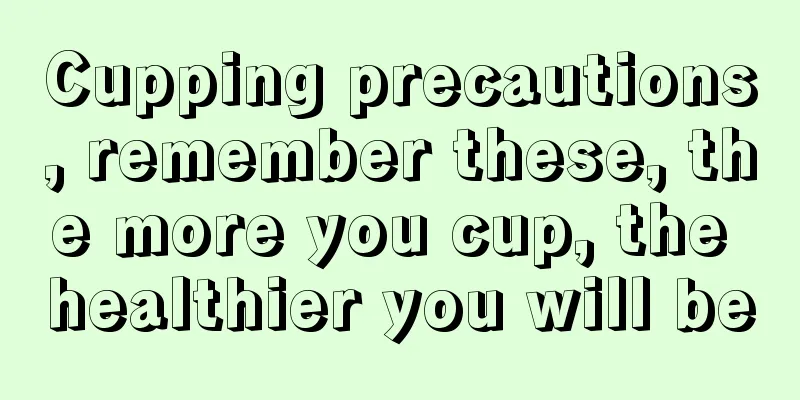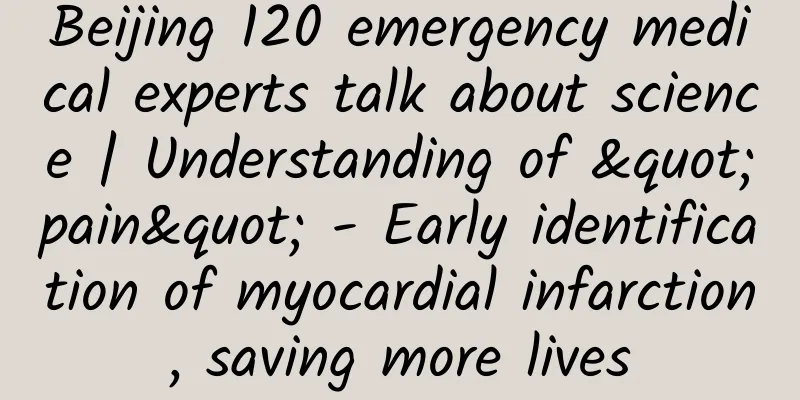Cupping precautions, remember these, the more you cup, the healthier you will be

|
Cupping is a traditional Chinese medical treatment and is also one of the popular health-preserving methods. Although it is effective, you still need to understand its precautions and contraindications when cupping. Cupping precautions 1. When cupping, the indoor air should be kept fresh, avoid direct blowing from fans in summer, and keep the room warm in winter to avoid cold. 2. Pay attention to cleaning and disinfection. The hands of the practitioner and the cupping area of the patient should be clean or disinfected regularly, and the cupping equipment must be disinfected regularly. 3. Blood stasis, small water droplets, itching, and cupping may cause small blisters and bleeding spots on local skin, which are all normal treatment reactions. Generally, Yang syndrome and heat syndrome often present bright red bruises; Yin syndrome and cold syndrome often present purple or light red bruises; cold syndrome and damp syndrome often present blisters and water droplets; deficiency syndrome often presents hot flushes or light red. If there are no local bruises, or if there is redness but it disappears immediately after the cupping, it means that the pathogenic factors are still mild, the condition is not serious or the disease is close to recovery. 4. Generally, it is not advisable to take a bath within 3 hours after cupping. 5. If the patient has cold limbs, nausea and vomiting, palpitations, pale face, fainting, cold sweats, dizziness, etc. during cupping, this is cupping sickness. Stop cupping immediately, let the patient lie down, drink warm water or sugar water, and rest for a while. Most patients will feel better. For those who suffer from severe cupping sickness, acupuncture or pressing of Baihui, Yongquan, Zusanli, Zhongchong, Neiguan and Renzhong acupoints should be performed, or moxibustion of Baihui, Qihai, Yongquan, Guanyuan and other acupoints should be performed. If necessary, the patients should be sent to the hospital for emergency treatment in time. Contraindications of cupping 1. Cupping is prohibited for patients with diseases that cause bleeding tendency, such as thrombocytopenia, leukemia, and allergic purpura. 2. It is forbidden to use on patients with new fractures, scars, local malignant tumors, varicose veins, large blood vessels on the body surface, or those with poor local skin elasticity. 3. Use with caution in the lower abdomen during menstruation. Do not use in the lower abdomen, lumbar region, and breasts during pregnancy. 4. It is contraindicated for patients with severe heart, kidney, liver diseases or high fever convulsions. 5. It is forbidden to use on skin allergies, injuries, and ulcers. 6. It should not be used on the facial features or the front and back genitals. 7. It is forbidden to use in cases of heavy bleeding, overeating, heavy sweating, extreme thirst, hunger, drunkenness and overwork. |
<<: Does liposuction surgery really cause loss of libido?
>>: Pollen mask has many benefits, try making it at home
Recommend
Half-month talk on Chinese medicine | Dandelion
· Interesting stories · Speaking of the "yel...
When is the best time for women to ovulate?
Every female friend wants to have her own baby af...
Vaginal itching with yellow discharge
The vaginal environment of women is very sensitiv...
What are the symptoms of fallopian tube inflammation?
Many families break up because both parties canno...
What medicine to use for lower body itching
Girls are quite sensitive about the feeling of it...
What did you say? I can't hear you without my glasses.
People with myopia often have a feeling After tak...
Uterine erosion, do you have these symptoms?
Uterine erosion is a common gynecological disease...
It hurts inside, what should I do?
In life, many women will experience symptoms of s...
What should pregnant women do if their nose is blocked?
After a woman becomes pregnant, her body's im...
Get more sun, it really can make you happier!
How long has it been since you had a good sun tan...
[Medical Q&A] It’s the peak season for allergies again. Do you know how to treat allergies?
Author: Wang Changyuan, Chief Physician, Xuanwu H...
How to reduce swelling after mosquito bites on babies? The harm of mosquitoes to babies
Generally speaking, applying some cooling oil or ...
What to do if menstruation does not come at 46 years old
Female friends have a few special days every mont...
White discharge on girls' underwear
When women reach puberty, the secretion of female...









